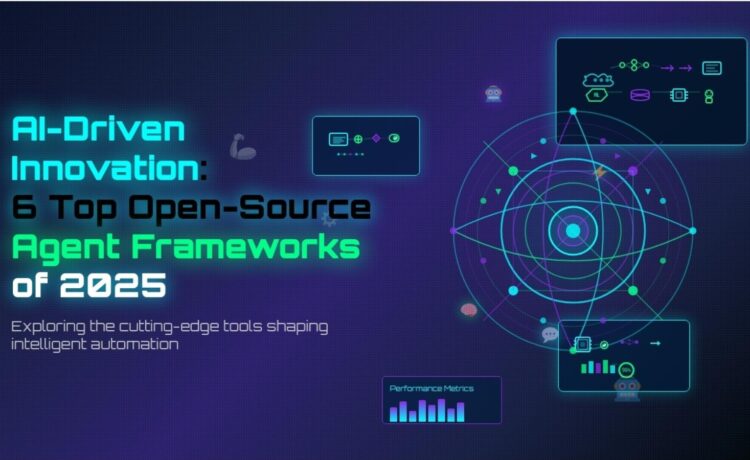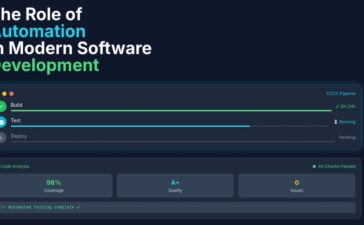Artificial Intelligence (AI) has revolutionized how business, developers and researchers create solutions. Starting with automation of frequently-repeated processes and ending with development of high-end decision-making systems, AI has stopped being a fad, and it became the new foundation of modern technology. AI agent frameworks are one of the most interesting spheres of AI in the year 2025.
These platforms enable developers to design self-running AI software or in other words, AI agents that may think on their own, learn and respond to the environment independently. If you are developing a chatbot, an autonomous workflow system or a multi-agent simulation, AI agent frameworks give you the tools to make it a reality.
At this blog, we are going to discuss what AI agent frameworks are, why the open-source version is that attractive and present 6 best open-source agent frameworks that will guide the innovation in AI in 2025.
What are AI Agent Frameworks?
A tool kit or platforms that assist developers in developing AI agents are called an AI agent framework. These agents are in a position to associate with data, users, or other agents so as to undertake activities. As opposed to simple AI models, agents are sometimes able to make optimized decisions dynamically, usually by combining reason, memory, and learning in real time.
An example would be a virtual assistant who is not only capable of answering your questions but also booking your meetings and flights and negotiating prices with other bots online. This can be done due to multi-agent frameworks, several agents cooperate towards one common objective.
Why Use an Open Source AI Agent Framework?
Open source frameworks are especially popular among developers because:
- Cost-effective: It is free to access and adopt.
- Community support: There are massive developer communities that will share latest updates, plugins and fixes.
- Flexibility: You will be able to shape the framework to your particular project.
- Innovation: Open-source work is keenly innovative with contributions of people around the world.
Concisely, when you are involved in the development of an AI, open-source tools will provide you with more flexibility and independence in experiments and development.
Key Benefits of Using AI Agent Frameworks
- Simplified Development Process
Building an AI agent from scratch is complex. Frameworks provide pre-built components like reasoning engines, memory modules, and communication layers. - Support for Multi-Agent Systems
Many modern applications—like simulations, game environments, or collaborative robots—require multi-agent frameworks where agents communicate and coordinate actions. - Integration with AI Development Tools
They tend to merge with well-used AI libraries (TensorFlow, PyTorch) and different AI agent development tools to provide easier workflows. - Scalable Solutions
From prototypes to enterprise-level deployments, frameworks help scale your agents as your project grows.
6 Top Open-Source AI Agent Frameworks of 2025
Here are the leading open-source frameworks making waves this year:
1. LangChain
One of the most well-liked techniques to create AI agents operating on language models is LangChain. It streamlines the development of reasons, plans, and would interact with data sources such as APIs, databases or even the web as agents.
- Why it’s great:
- Strong support for Large Language Models (LLMs).
- Easy integration with other services like OpenAI, Hugging Face, and vector databases.
- Perfect for building conversational agents and knowledge assistants.
- Strong support for Large Language Models (LLMs).
- Best for: Developers building chatbots, virtual assistants, or research tools.
2. Microsoft Autogen
Autogen by Microsoft is a multi-agent framework designed for creating collaborative AI systems. It allows multiple agents to communicate, negotiate, and work together to solve complex tasks.
- Why it’s great:
- Built for multi-agent collaboration.
- High compatibility with Python-based AI development.
- Strong documentation and active community support.
- Built for multi-agent collaboration.
- Best for: Teams working on automation workflows or simulations requiring multiple agents.
3. Haystack
Developed by deepset, Haystack is an open source AI agent framework focused on search and question-answering applications. It’s widely used for building retrieval-augmented generation (RAG) systems.
- Why it’s great:
- Strong document search and retrieval capabilities.
- Integrates seamlessly with LLMs for hybrid solutions.
- Excellent for enterprise knowledge management.
- Strong document search and retrieval capabilities.
- Best for: Building enterprise search tools or AI-powered knowledge bases.
4. LlamaIndex (formerly GPT Index)
LlamaIndex specializes in connecting language models to external data sources. It acts as a bridge, helping AI agents access and reason over structured and unstructured data.
- Why it’s great:
- Powerful data indexing features.
- Easy to customize for different data pipelines.
- Works well alongside LangChain and other frameworks.
- Powerful data indexing features.
- Best for: Data-heavy AI agents that need structured information retrieval.
5. CrewAI
CrewAI is a rising star among top AI agent frameworks in 2025. It’s designed for creating teams of agents that can collaborate on projects—perfect for workflows involving planning, research, and execution.
- Why it’s great:
- Built specifically for team-based multi-agent systems.
- Simple API for assigning roles and tasks to agents.
- Supports parallel task execution for efficiency.
- Built specifically for team-based multi-agent systems.
- Best for: Collaborative research assistants or content generation teams.
6. OpenDAN (Decentralized AI Network)
OpenDAN is an innovative open source AI agent framework focused on decentralization. It allows agents to operate in distributed environments, sharing tasks without relying on centralized servers.
- Why it’s great:
- Focused on privacy and decentralization.
- Ideal for peer-to-peer and edge computing scenarios.
- Encourages innovation beyond traditional cloud AI.
- Focused on privacy and decentralization.
- Best for: Developers interested in decentralized AI ecosystems.
How to Choose the Best Agent Framework
With so many options available, how do you select the best agent framework for your project? Here are a few tips:
- Project Requirements: Will you make a single-agent or a multi-agent framework?
- Community & Documentation: See the activity levels of the community, and the friendliness of documentation to the developer community.
- Integration Needs: Does it work well with your existing AI development tools?
- Scalability: Can it grow with your project as you move from prototype to production?
The Future of AI Development with Agent Frameworks
Since AI is still developing, agent frameworks will be more important to establish intelligent, autonomous systems. Collaborative AI is moving in the direction of multi-agent frameworks, in which several agents co-operate, in the same way as human teams.
There are endless possibilities for developers. Whenever you are ready to play with chatbots, automate your job cycle, or come up with a complicated simulation, the open-source ecosystem will provide you with all the tools to innovate.
Already, 2025 is shaping up to be a marker in the field of AI-driven innovation and these frameworks are steering the way into the next frontier.
Conclusion
Artificial Intelligence agents are not a notion of the future any more; they are real, and they spur innovation in industries. With these best AI agent frameworks, you can benefit with more possibilities in automation, research and product development. Considering the fact that we are on the same track, and you want to stay at the top of AI development, this is the right time to jump into the tools so that you can begin experimenting.





